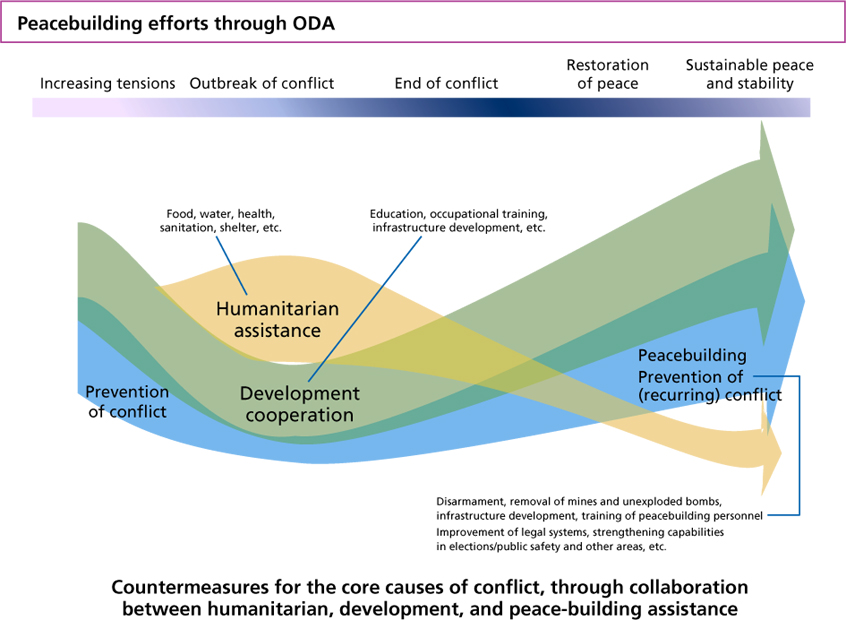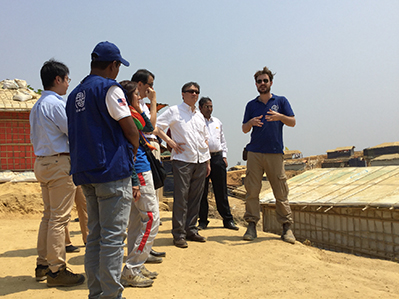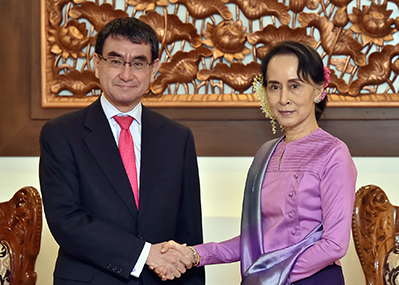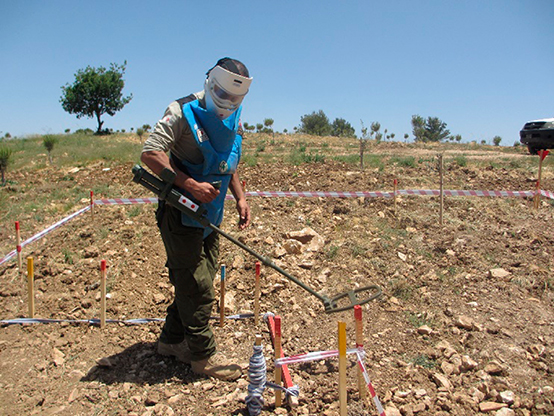2-2 Assistance for Ensuring Peace, Stability, and Security
(1) Support for Peacebuilding and Refugees/Displaced Persons
Regional and internal conflicts arising from ethnic, religious, and historical differences continue to pose challenges for the international community. Such conflicts generate a great number of refugees and displaced persons, resulting in humanitarian crises and violations of human rights. These conflicts also undermine the progress in development achieved through long-term efforts, and cause massive economic losses. Therefore, it is important for the entire international community to engage in “peacebuilding” for the establishment of foundations for development in order to prevent conflicts, avoid their recurrence, and consolidate sustainable peace.

■Japan’s Efforts
Discussions on integrated support from the resolution of conflicts to recovery, reconstruction and nation-building have been held in fora such as the United Nations Peacebuilding Commission (PBC), which was established in 2005, and Japan has been pursuing intensive efforts from the standpoint of proactive contribution to peace, based on the principle of international cooperation. In 2016, then Foreign Minister Kishida chaired an Open Debate of the UN Security Council held in New York, on the theme of “Peacebuilding in Africa.” Moreover, at a Pledging Conference for the UN Peacebuilding Fund, Japan declared that it would contribute around $10 million in the coming years. Up until now, Japan has contributed $50.5 million to the Peacebuilding Fund. In 2018, the “Secretary-General Report on Peacebuilding and Sustaining Peace” was published, and a variety of recommendations were made, aiming at strengthening fund procurement for peacebuilding, increasing the consistency of the policies and activities of the UN PBC, strengthening the leadership, accountability and capacity of the UN, and strengthening partnership with international organizations and civil society. In April of the same year, the “High-Level Meeting on Peacebuilding and Sustaining Peace” was held, and Japan pledged to support the initiatives of the Secretary-General in the area of peacebuilding.
Moreover, Japan provides various types of support, for refugees and displaced persons affected by conflict, such as food assistance, and electoral assistance for political peace processes. In addition, after a conflict is resolved, Japan assists in Disarmament, Demobilization and Reintegration (DDR) of ex-combatants in order to rebuild the national security sector to ensure domestic stability and security, and promote the consolidation of peace. Japan also extends support for the reconstruction of affected countries in such areas as the repatriation and resettlement of refugees and displaced persons, and the rebuilding of basic infrastructure (socio-economic infrastructure). Further, in order to consolidate sustainable peace and ensure that conflicts do not reoccur, Japan works to strengthen the administrative, judicial, and policing functions of the country in question, while supporting the development of economic infrastructure and institutions, and pursuing efforts in the social sectors of healthcare and education. In such undertakings, maximum consideration is given to the importance of the roles that women can play in peacebuilding. In order to provide these supports in a seamless manner, Japan takes an approach that combines assistance through international organizations, grant aid, technical cooperation, and ODA loans.
Furthermore, the Development Cooperation Charter outlines that Japan will strengthen coordination between development cooperation and international peace cooperation activities such as UN peacekeeping operations (PKOs). In the fields where UN PKOs are deployed, many initiatives are underway which contribute to efforts for protecting refugees, women, and children affected by conflict and developing basic infrastructure. To maximize the effects of such efforts, it remains important for Japan to promote such forms of cooperation.
●Support for Refugees and Displaced Persons
Given the situations in Syria, Bangladesh, Myanmar and other countries, the number of refugees and displaced persons worldwide at the end of 2017 reached its highest level since the end of World War II, and humanitarian situations are becoming increasingly severe. From the viewpoint of human security, Japan is providing humanitarian assistance, including assistance for refugees and displaced persons, in order to ensure the life, dignity, and security of the people in the most vulnerable positions, and to support the realization of self-reliant development, wherein each person is capable of getting back on their own feet.
In particular, Japan works with international organizations, mainly the United Nations High Commissioner for Refugees (UNHCR) and the International Organization for Migration (IOM) to provide refugees and displaced persons around the world with assistance by distributing food, shelter and basic supplies necessary to live. Furthermore, through cooperation with the World Food Programme (WFP), the United Nations Relief and Works Agency for Palestine Refugees in the Near East (UNRWA), International Committee of the Red Cross (ICRC) and other international organizations, Japan is providing assistance for refugees even in locations with security concerns, by utilizing their expertise and delivering capabilities.
Upon providing this kind of assistance for refugees through international organizations, Japan put importance on collaboration with Japanese entities such as JICA, Japan’s development cooperation implementing agency, as well as private companies. For example, in the case of refugee assistance by UNHCR, Japan works in collaboration with JICA to implement a program combining emergency and reconstruction assistance. In addition, the incorporated non-profit organization, Japan Platform (JPF), an emergency humanitarian aid organization, established in 2000 in cooperation with NGOs, the Government, and the business communities (see “B. Cooperation with Japanese NGOs”), has been supporting refugees and displaced persons. In 2018, it provided support for the response to the humanitarian crises in Yemen, and in Iraq and Syria, humanitarian support for Palestine and Gaza, assistance for South Sudan, as well as support for the response to the humanitarian crisis in Afghanistan, humanitarian support for displaced persons from Myanmar, and more.
Japan is also promoting “development cooperation” to help countries to stand on their own from the medium to long-term perspective, in parallel with urgently required “humanitarian assistance,” from the initial phases after a humanitarian crisis arises (humanitarian-development nexus). This is extremely important for preventing refugees and displaced persons from descending once again into a situation that will require humanitarian support. Furthermore, in addressing prolonged and escalating humanitarian crises, it is necessary to drastically strengthen measures for addressing the root causes of the conflict. In order to realize this, Japan continues to place importance on the idea of “humanitarian, development and peace nexus,” and is seamlessly extending “support for peacebuilding and the prevention of the recurrence of conflicts,” and “support for poverty reduction and economic development,” in countries and regions where humanitarian crises due to the outbreak of conflicts have arisen.
Specific Example: Humanitarian Assistance for Displaced Persons in Rakhine Province, Myanmar
In Northern Rakhine state, Myanmar, the attack on security forces by the Arakan Rohingya Salvation Army (ARSA) in August 2017, the clearance operations by the Myanmar security forces and the subsequent destabilization resulted in approximately 700,000 displaced people flowing into the southeastern part of Bangladesh. The humanitarian situation among the displaced persons living in camps in the region deteriorated, and severely impacted the living environment in the surrounding host communities (regions that accept refugees).
Given this situation, Japan has been providing support in Bangladesh through Japanese NGOs since October 2017, by distributing essential supplies for living, improving the hygiene environment providing medical treatment and protecting women and children through Japan Platform (JPF). In February 2018, Japan decided to provide support for the improvement of the living environment of the displaced persons from Myanmar and the host communities, including water and sanitation, health and medical care, and education, through international organizations and NGOs, and has been providing support for securing new water sources, repairing existing water sources, installing toilet facilities, and more for the displaced persons from Myanmar in Bangladesh, through UNICEF. Furthermore, in January 2019, in collaboration with the WFP, Japan decided to implement a grant aid program to provide food aid for the displaced persons, and to support the improvement of living conditions among small-scale farmers in Bangladesh, in which host communities are included.
In Myanmar, Japan decided to provide support for creating an environment conducive to the return of displaced persons in January 2018, and began the construction of houses and community centers. In February, Japan additionally decided to provide food, nutrition, health and sanitation support through international organizations.
Going forward, Japan will continue to provide support in both countries, in order to improve the humanitarian situation, and to create an environment conducive to safe, dignified and voluntary return of the displaced persons.

Then Parliamentary Vice-Minister for Foreign Affairs Iwao Horii visiting and observing temporary refugee camps in Balukhali and Kutupalong in the Ukhia district of Cox’s Bazar in Bangladesh, in March 2018

In January 2018, Foreign Minister Taro Kono visited Myanmar, where he met and held a joint press conference with Aung San Suu Kyi, State Counsellor and Foreign Minister of the Republic of the Union of Myanmar.
●Protection and Participation of the Socially Vulnerable
Although socially vulnerable people including persons with disabilities brought about by conflict or landmines, orphans, widows, ex-combatants including child soldiers, and displaced persons are susceptible to the impact of a conflict, the reality remains that the socially vulnerable often receive delayed assistance in post-conflict recovery, and often find it difficult to access the benefits of peace and reconstruction.
From this perspective, as one program to support displaced persons, the government of Japan worked together with a Japanese NGO, the Japan Chernobyl Foundation (JCF), to improve health services for displaced persons in Erbil of the Kurdistan Region of Iraq, by providing medication guidance to local physicians, as well as medical supplies and equipment. Furthermore, for the social reintegration of child soldiers and protection and empowerment of children, who are the most vulnerable in conflict-affected areas, Japan has been providing support through UNICEF. For example, in the Central African Republic, Japan contributes in funding to the project for “Liberation of Children from Armed Groups and Support for their Social Integration” through UNICEF.
●Reconstruction of Social and Human Capital
Japan supports the reconstruction of social capital and restoration of human capital who participate in economic activities in countries affected by conflict. This support is aimed at preventing new conflicts from emerging, and eliminating factors that could cause new conflicts before reconstruction or nation-building.
In regards to the reconstruction of social capital, Japan is putting particular effort in the following five areas: (i) development of social infrastructure, (ii) development of transportation, power grids, and telecommunications networks, (iii) improvement of health and medical system functions, (iv) improvement of education system functions, and (v) food security. As for the reconstruction of human capital, while combining assistance aimed at medium to long-term economic development as much as possible, Japan seeks to help develop an economic environment as well as improve livelihoods and increase job opportunities with a focus on preventing social instability caused by rising unemployment and other factors.
●Countermeasures Against Antipersonnel Landmines, Unexploded Ordnance, and Small Arms and Light Weapons
In countries and regions where there has previously been conflict, antipersonnel landmines and unexploded ordnance (UXO) remain to this day, and illicit small arms and light weapons are still widely used. These devices not only harm ordinary civilians and others indiscriminately and hinder reconstruction and development activities, but also are a cause of exacerbation of conflict. It is important to cooperate continuously to stabilize communities and ensure security in these countries, through such efforts as the disposal of antipersonnel landmines and UXOs, appropriate management of small arms, and support and capacity building for landmine victims.
As a state party to the “Convention on the Prohibition of the Use, Stockpiling, Production and Transfer of Anti-Personnel Mines and on Their Destruction” and the “Convention on Cluster Munitions,” Japan has steadily implemented international cooperation through preventive efforts such as risk reduction education, from the perspective of the humanitarian, development and peace nexus. For example, Japan has supported the Cambodian Mine Action Centre (CMAC) not only in terms of equipment provision, but also in the establishment of a curriculum for training in landmine clearance, and building the foundations of landmine clearance education. Employees who have taken the training are engaged in efforts to disseminate the technical expertise on landmine clearance throughout Cambodia and abroad. Furthermore, such support has even achieved South-South cooperation, as CMAC is also functioning as a training center for staff responsible for landmine countermeasures from other countries, such as Colombia.
In Afghanistan, an incorporated non-profit organization, the Association for Aid and Relief, Japan (AAR Japan), also a specified non-profit corporation, provides outreach education to raise awareness on the dangers of landmines, UXOs and other remnants of conflict, and on the proper ways of avoiding them. Since FY2009, through the Grant Assistance for Japanese NGO Projects and JPF, AAR Japan has been conducting Mine Risk Education (MRE) in several parts of Afghanistan through development of teaching materials, and conducting training seminars, etc. The organization also trains local people to conduct MRE by themselves. Through such activities, education and awareness-raising activities for the local people are in progress.
Furthermore, in Laos, which has been particularly affected by UXOs, Japan has mainly carried out the dispatch of UXO experts, provision of equipment, and South-South cooperation. Japan has also supported capacity building for organizations that dispose of UXOs, and it has carried out the mechanization of shrub removal and development of forward outposts in Sekong Province, Salavan Province, and Champasak Province, all of which are poor regions that have endured especially great suffering from UXOs. Japan is also providing assistance for land development after the disposal of UXOs.
In addition to providing bilateral support, Japan is proactively engaged in mine actions through international organizations. In 2018, Japan supported clearance and risk avoidance education, against landmine and UXOs through the United Nations Mine Action Service (UNMAS), in Afghanistan, Iraq, Syria, South Sudan, Sudan and the Democratic Republic of the Congo. Moreover, Japan has supported the strengthening of landmine disposal training for Central and West Africa in the Center for Humanitarian Demining Training in Benin for the disposal of landmines and UXOs in the country’s conflict-affected areas, via the United Nations Development Programme (UNDP). Likewise, Japan has provided support for risk reduction education in Palestine, Yemen, Central Africa, Chad, South Sudan, Iraq and Ukraine, via UNICEF since 2015. It is also supporting risk reduction education against landmines and the provision of prosthetic legs for people injured by landmines in Afghanistan, Iraq and Jordan, through the International Committee of the Red Cross (ICRC).
Moreover, in terms of countermeasures for small arms and light weapons, Japan has provided support for the collection, disposal, and appropriate stockpile management, in combination with development assistance. In addition, with a view to improving national security, as well as strengthening the capacity to manage and control the import and export of arms, Japan has supported the development of relevant legal systems, capacity building of customs agencies, police forces and other law enforcement agencies, and supported the implementation of Disarmament, Demobilization, Reintegration (DDR) projects for ex-combatants and former child soldiers.

Clearance of mines remaining from the 2006 Israel Conflict in Lebanon, using equipment supplied via support from Japan (Photo: Sandrine Hashem / Embassy of Japan in Lebanon)
●Human Resources Development for Peacebuilding
Activities required in the field of peace building and qualities needed for those engaged in such activities are undergoing diversification and increasing in complexity. In response to this trend, Japan has implemented the Program for Human Resource Development for Peacebuilding to train civilian experts from Japan and other regions so that they can play an active role in the field (FY2007 to FY2014). The “Primary Course,” the major pillar of the program, targets individuals with a strong interest in developing a further career in the field of peacebuilding and consists of coursework in Japan for acquisition of the practical knowledge and skills required on the frontline in peacebuilding, the overseas assignment, through which participants work at field offices of international organizations engaged in peacebuilding, and support for course graduates to build up their careers. In FY2015, the program was renamed the “Program for Global Human Resource Development for Peacebuilding and Development” and its content has been expanded subsequently. Besides the existing “Primary Course,” this program includes a “Mid-Career Course,” which supports the career advancement of individuals with a certain degree of practical experience in the fields related to peacebuilding and development, and a “Global Career Course” (started in FY2018) for practitioners aiming to build a new career in international organizations, in addition to which career development support for the acquisition of skills and knowledge necessary to obtain posts and advance in international organizations. Many graduates of these courses are currently playing an active role in the fields of peacebuilding and development in countries such as South Sudan, Jordan, and Israel.
